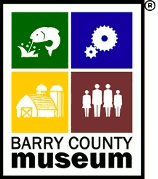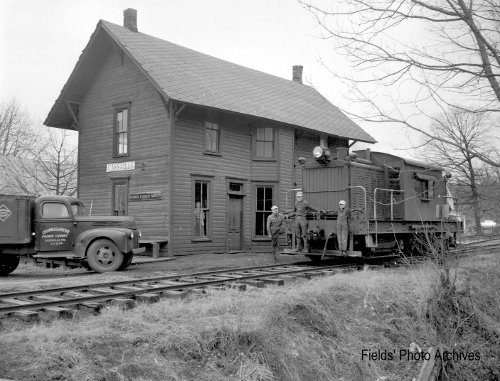Cassville
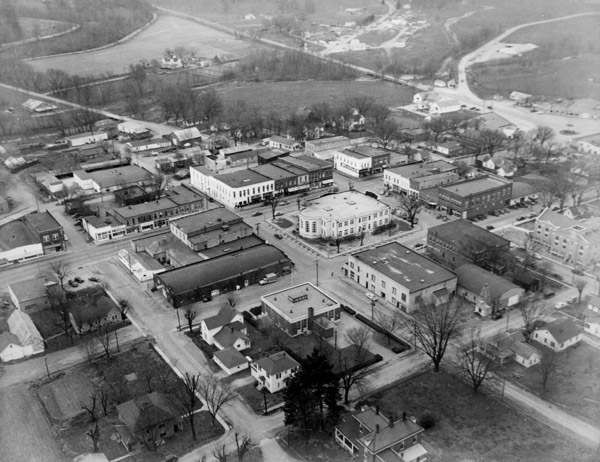 |
Cassville 1950 |
| It was on June 6, 1845, that the Barry County Court, meeting in regular session at the then county seat of McDowell, finally decided to locate the seat of justice at a town to be established at about the center of Barry County on Flat Creek. An order was made, naming it “Cassville,” after the Michigan statesman, General Lewis Cass, and directing that the new town be surveyed and laid out. Only one house stood on the town-site, that of William Kerr, and the seat of justice was established in it. The act to incorporate the town of Cassville was not approved, however, until March 3, 1847, providing for the election of trustees and the enactment of ordinances. A single road served the territory at that time, coming down from Springfield to Fayetteville, Arkansas. Cassville Post Office was established November 5, 1845, and less than one year later a mail contract from Springfield to Fayetteville was let to Joseph Burdin of Springfield, 109 miles and back three times a week in two-horse coaches, for $1,000.00 per year. Since that time 29 postmasters have served Cassville. For a number of years the only buildings in Cassville were of log construction. The early settlers had gradually crowded the few scattering Indians further to the west and southwest and living here became safe. Several gristmills on the creek were depended upon for the grinding of grain produced and harvested by the crudest of implements. There were a few tan yards to tan leather from which shoes worn by the early residents were made. Some of the early family names prominent in the history of Cassville, are McCary, Phariss, Mason, Townsend, Hubbert, Hague, Watson, Walker, McConnell, Wyrick, Grammer, Boone, Moore, Ray, Drake, Messer, Bayless, Steele, Talbert, Black, Meador, Hobbs, Burton, Greenwood and Logan. A large steam flouring mill, one of the first in Ozarks, was built by the Logan family in 1857. It along with many other structures were destroyed during the battles of the Civil War in 1862. The first court house, on the present court house site, was constructed during the years of 1848 and 1849. Tallow candles, as late as 1857 were used to light it. Cassville secured its only means of communication with the outside world (other than by road) when the telegraph in 1859 was brought from Springfield to Ft. Smith through Cassville along what was later to be known as the “Old Wire Road.” While the clouds of the Civil War hovered over the Midwest the House and Senate of Missouri, Governor Claibourns S. Jackson’s legislature, met at Neosho in October of 1961. A series of six resolutions were presented by Representative George G Vest of Cooper county complaining of the action of Federal Troops. The resolutions were passed and Vest then wrote the Act of Secession which was enacted by the legislature at Neosho. Union forces then converging on that community caused a hasty removal of the legislature to Cassville, where the first meeting was held at the court house on October 31, 1961. The group continued in session until November 7 and then they adjourned. The courthouse served as Union headquarters during the Civil War. The town, almost in its entirety, was destroyed by the ravaging warfare in 1862 when both the Union and Confederacy fought for possession. The Union forces won and aside from intermittent guerilla warfare were not seriously challenged thereafter. |
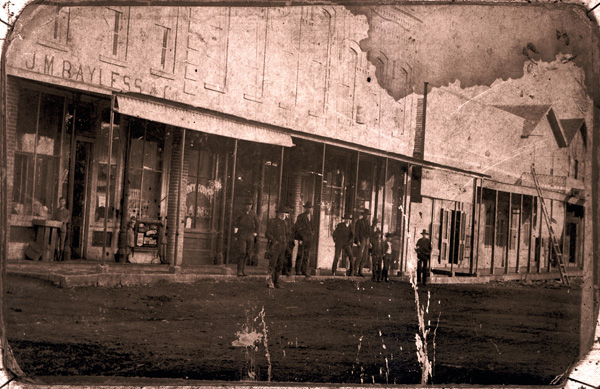 |
J.M. Bayless and Co and Barry County Bank on Main Street 1880s |
| A newspaper (that had been a rare thing received only from larger cities) was established in Cassville in 1867 by J.S. Drake, The Barry County Banner, to be succeeded quickly by The Cassville Republican; and shortly thereafter The Cassville Democrat was started. These two newspapers have continued to serve the people of Barry County throughout these many years and rank as among the oldest in the Ozarks. From 1870 to 1880 there were two rival business points in the county, Cassville and the old town of Washburn, earlier known as Keetsville, where Highway 37 now runs. The towns were about equal in population—some 500 each. When the Frisco railroad was built through the country in 1880-81, a number of new towns sprang up—Exeter, Purdy, Butterfield, and the new town of Washburn, and Seligman. Cassville then passed through its hardest period since Civil War days. A Railroad then was of prime importance in area development, and the Frisco dealt a serious blow by bypassing it, taking it off the main stream of travel. |
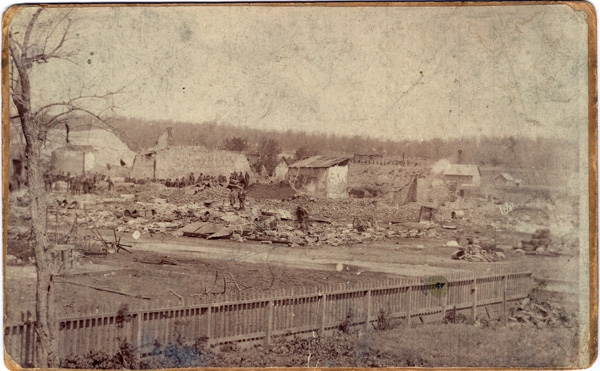 |
Cassville Fire of April 18th, 1893 |
| And a major disaster also occurred about this time. A fire in 1883, destroyed most of the business district of Cassville, including both banks, both newspaper offices, two hotels, the lumberyard, two drug stores, two hardware stores, several clothing stores and grocery stores along with restaurants, salons and other places of business. Only a few business building remained after the disaster. But the town survived and the tide turned when her citizens in 1896 built the short railroad line connecting with the Frisco at Exeter, known as the "Cassville and Western Railway." On July 4, 1896, the first train to come into Cassville arrived from Exeter. Some 8,000 persons were present for the occasion which was held in conjunction with the Old Soldiers and Settlers Reunion; the Sunday School Convocation, and a giant fireworks di splay to commemorate the Nation's anniversary. The railroad still operates today and is known as the shortest standard gage railroad in the United States. It is owned by the businessmen of Cassville and operated by Mr. & Mrs. James G. Ashley. Cassville today is still a small city, but she has changed in these 110 years from the tiny village of log houses to a town with modern conveniences, paved streets, electric power facilities, modern water and sewage systems and fine schools, churches, business building and homes. Its economy is sound and diversified. Dairying brings local producers more than four million dollars annually. Poultry and broilers, more than three million. Livestock, close to one million, Fruits and vegetables, one and one-half million. Two large industries alone, Forest Products, hardwood manufacturer, and Mozark Poultry Company, processor, provide a payroll of some three hundred thousand dollars. Thousands of tourists who visit this “City of Seven Valleys” provide another substantial source of local income. The best proof of the civic push and pride of Cassville is found in the large membership of its chamber of Commerce—220 members out of the total population of 2200. From Cassville Republican 1955 |
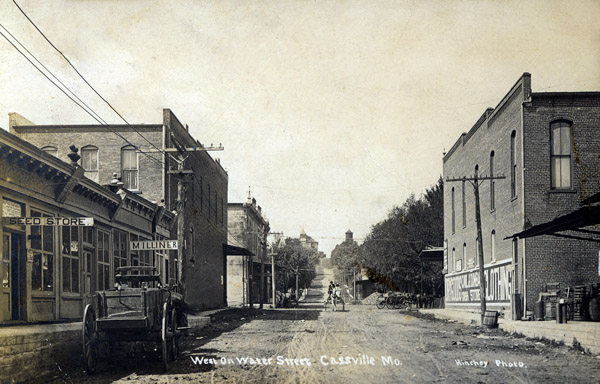 |
Water Street Cassville 1910 |
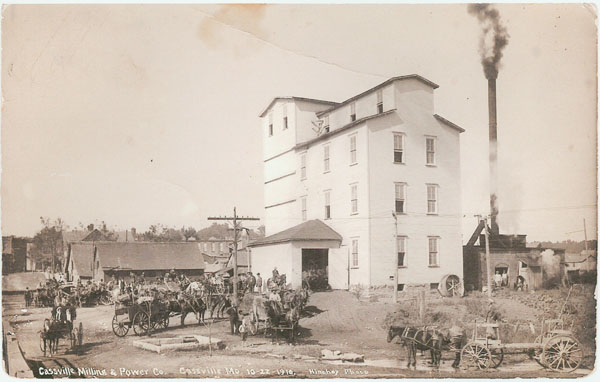 |
Cassville Milling and Power 1910 |
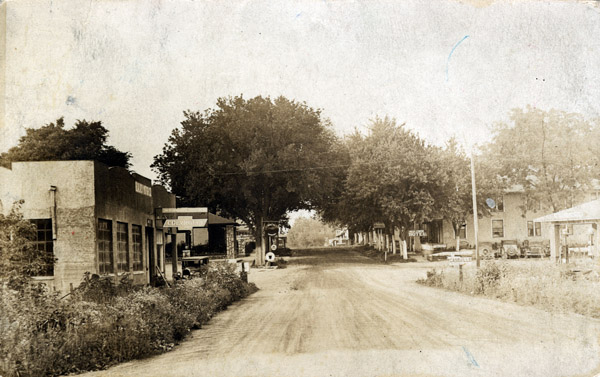 |
Cassville 1929 |
|
Cassville Depot 1954 |
